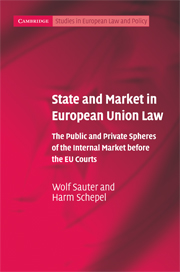 State and Market in European Union Law
State and Market in European Union Law Book contents
- Frontmatter
- Contents
- Acknowledgements
- Abbreviations
- Table of Cases
- 1 Introduction
- PART I Economic activities v. the exercise of public authority
- PART II The Public Private Interface: Articles 31, 86 and 87–88 EC
- 5 Article 31 EC: commercial state monopolies
- 6 Article 86(1): public undertakings, special and exclusive rights
- 7 Article 86(2) EC: derogation for services of general economic interest (SGEI)
- 8 Articles 87–88 EC: State aid
- 9 Conclusion
- References
- Index
- CAMBRIDGE STUDIES IN EUROPEAN LAW AND POLICY
8 - Articles 87–88 EC: State aid
Published online by Cambridge University Press: 22 January 2010
- Frontmatter
- Contents
- Acknowledgements
- Abbreviations
- Table of Cases
- 1 Introduction
- PART I Economic activities v. the exercise of public authority
- PART II The Public Private Interface: Articles 31, 86 and 87–88 EC
- 5 Article 31 EC: commercial state monopolies
- 6 Article 86(1): public undertakings, special and exclusive rights
- 7 Article 86(2) EC: derogation for services of general economic interest (SGEI)
- 8 Articles 87–88 EC: State aid
- 9 Conclusion
- References
- Index
- CAMBRIDGE STUDIES IN EUROPEAN LAW AND POLICY
Summary
Introduction
The State aid rules aim to provide a level playing field in the internal market, combating foreclosure of market entry as well as distortions of competition by governmental favouritism at the expense of the public purse and/or contributions by market participants. Although today almost all governments subscribe to the view that economic performance based on subsidies and handouts is unsustainable, this remains a sensitive area, in particular where distressed sectors are involved. Now most Member States have surrendered their monetary management to the European Central Bank and the European System of Central Banks subsidies is one of the few ways of influencing the economy that is left.
The Treaty's provisions on State aid have arguably gained in significance over the decades, for two main reasons. First, widespread privatisation across the Member States has resulted in public authorities looking for alternative methods of public intervention and market manipulation, many of which are subject to scrutiny under the State aid rules rather than, say, Article 86. Second, the Court's interpretation of the main provisions to apply far beyond mere subsidies and other blunt financial handouts has led them to acquire ‘constitutional’ significance for being used to separate legitimate mechanisms and methods of State intervention from illegal protectionism.
The State aid regime is a notoriously complex area of EC law,2 notably because of the procedural intricacies involved in the notification and recovery schemes. This chapter, as throughout this book, will focus on selected issues related to the demarcation of the public and private spheres. First, the chapter discusses the definition of the State itself for purposes of the personal scope of Article 87 EC.
- Type
- Chapter
- Information
- State and Market in European Union LawThe Public and Private Spheres of the Internal Market before the EU Courts, pp. 193 - 210Publisher: Cambridge University PressPrint publication year: 2009


